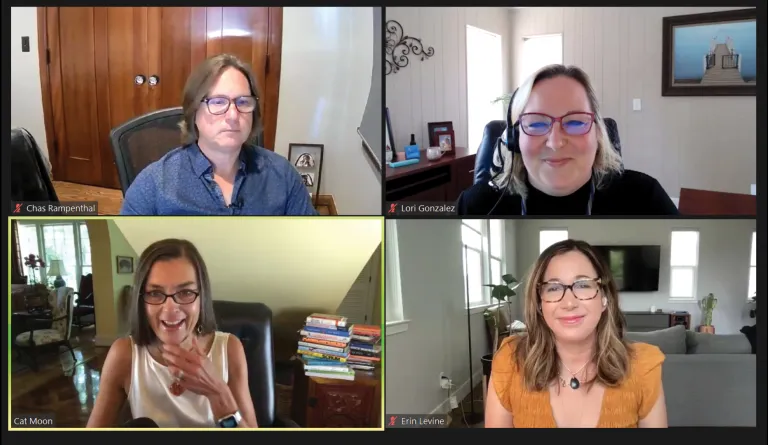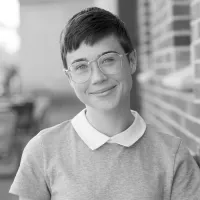IAALS Panel Explores the Opportunities and Challenges of Legal Technology

On August 24, IAALS co-hosted the second session of the Redesigning Legal Speaker Series, bringing together an audience of 145 people to learn about and discuss how lawyers and other legal professionals can help to solve access-to-justice problems using new advances in technology—while building sustainable practices at the same time. “Legal Tech—Using Technology to Build Sustainable Practices & Expand Legal Services” featured a panel including Erin Levine, founder of Hello Divorce; Chas Rampenthal, head of industry relations at LegalZoom; and Lori Gonzalez, founder of the RayNa Corporation. Their conversation was moderated by Cat Moon, director of innovation design at Vanderbilt University. Video of the event is available below, and a video with transcript is available here.
“The issues we have the opportunity to explore in this conversation are critical to the future of our profession and to, frankly, the future of the rule of law,” said Cat Moon, adding that the people served by the profession are in the fourth industrial revolution; lawyers are trying to solve their problems in antiquated structures that are under so much pressure, they’re beginning to break. New structures within which to practice law are essential to the future of the profession, as well as the profession’s ability to tackle the access-to-justice crisis.
Chas Rampenthal echoed this sentiment, stressing that lawyers need to meet consumers where they already are. “I think a lot of people are going to beat the drum of access to and adoption of technology,” he said. “But lawyers need to understand that the consumers they’re serving also have adopted this technology. . . . It’s not going to be novel.” And while fountain pens and typewriters have been replaced by computers and phones, the underpinnings of the legal business model, Rampenthal explained, haven’t changed. He hopes to see people push against boundaries and find smart ways to utilize technology and improve their workflow.
And when it comes to redesigning these new structures, Erin Levine explained how lawyers are well-suited to be at the forefront of this effort. “If you’ve been practicing landlord-tenant or bankruptcy or immigration or divorce, you have all this data from years and years of practicing law, and you know exactly where the friction points are, what clients need, how they process information—and when they actually need a lawyer to step in and help them.” Like Rampenthal, she noted that consumers are already turning online for legal services, especially in the wake of the COVID-19 pandemic. “They’re looking for law to provide a similar user experience as they have with other services and technology.”
Lori Gonzalez pointed out that nearly half (41 percent) of consumers aren’t considering lawyers for issues such as traffic, family law, and wills, which are form-heavy and often confusing procedures—and are also great opportunities for lawyers to step in and build technology services for.
“There’s this huge idea that people just don’t want to hire lawyers because of cost. But there’s plenty of data out there . . . [that] clients prefer to handle their own problems. So, how can we empower them, and how can we actually have some opportunity and make some money in legal by simply empowering people to handle their own problems?”
Clearly, there is ample opportunity when it comes to legal technology—but the panelists and many others in the profession are operating under restrictive conditions. Levine believes it’s difficult to scale and offer comprehensive services across different practice areas in our highly localized legal system. Laws don’t just vary from state to state—processes and procedure can vary from county to county, and even court to court. And, some courts still have unwieldy requirements such as written signatures and hand-delivered documents. “How are we supposed to provide meaningful help—get users and consumers the content and automation they crave—when we have such huge challenges within the system and, in some cases, it feels like the system is working against us, not with us?” Gonzalez concurred that courts have been one of the hardest places to implement real change, and expressed that lawyers have lost the ability (or perhaps, never gained the ability) to bring in real partnerships and collaborate with diverse skill sets.
Rampenthal took aim at some lawyers’ doomsday attitude about regulatory reform and suggested they need to stop thinking about the what-ifs, and start thinking about what already is: “Eighty percent of people don’t see value in what we do.” Instead of only handling emergencies, lawyers need to embrace the idea of preventative care, and keeping consumers’ legal lives healthy.
So how do we prepare the next generation of lawyers take on these problems? Rampenthal encouraged people to stop thinking they have to be everything—not just a lawyer, but a technologist, a chief operating officer, a business development guru—and start listening to those professionals instead. “Be open to the opinions of people without a JD.”
Gonzalez hopes that law schools will “start to build some real curriculum around inviting in real experts for those things that are going to be needed for law students to come out and start their own law firms and get innovative with legal services,” as well as embed more technology into their curriculum.
Levine also expressed the need for more holistic legal education: “What we aren’t taught is . . . data, and how consumers learn and how they consume information, and how they manage their stress when they’re going through legal conflicts.” The more we can give budding lawyers an idea of what it’s like to actually help people going through a really hard time, she said, the better. And being able to join forces with a host of other professionals, and utilize the incredible technology available to those in other professions, will set them up for even greater success.
We are so grateful to Erin Levine, Chas Rampenthal, and Lori Gonzalez for their insights, and to Cat Moon for moderating their inspiring conversation. Redesigning Legal will continue this conversation on Twitter Spaces on September 28, when Chris Bentley of the Legal Innovation Zone will host an open-ended discussion on these same topics. We hope you’ll join us for that discussion and for our next session in our Redesigning Legal Speaker Series, which will be held in October. Stay tuned!
Redesigning Legal: Legal Tech—Using Technology to Build Sustainable Practices & Expand Legal Services from IAALS on Vimeo.
